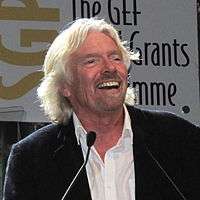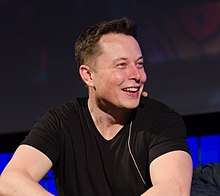Billionaire space race
The billionaire space race[2][3][4] is the intense rivalry in NewSpace by recent space entrepreneurs, who entered the space industry as billionaires from other industries, particularly computing.[5][6] This private industry space race of the 21st century involves sending rockets to the ionosphere (mesosphere and thermosphere), orbital launch rockets, and suborbital tourist spaceflights.[7]
Amongst the billionaires entering into NewSpace are:
- South-African-Canadian-American billionaire Elon Musk,[3] behind SpaceX and a project to colonize Mars.[4][1]
- American billionaire Jeff Bezos, behind Blue Origin and establishing a true industrial base in space.[4][2][1]
- British billionaire Richard Branson,[3] behind Virgin Galactic/Virgin Orbit and space tourism, low-cost small orbital launchers, and intercontinental suborbital transit.[4][2][1]
- Russian billionaire Yuri Milner, backing the Breakthrough Starshot project for an interstellar probe.[5]
Background
The groundwork for the billionaire space race and NewSpace was arguably laid by Peter Diamandis, an American entrepreneur. In the 1980s, he founded an American national student space society, the Students for the Exploration and Development of Space (SEDS). Later, Jeff Bezos became a chapter president of SEDS. In the 1990s, Diamandis, disappointed with the state of space development, decided to spur it on and spark the suborbital space tourism market, by initiating a prize, the X Prize. This led to Paul Allen becoming involved in the competition, creating the Scaled Composites Tier One platform of SpaceShipOne and White Knight One which won the Ansari X-Prize in the 2000s. The technology of the winning entrant was then licensed by Richard Branson's Virgin Group as a basis to found Virgin Galactic. The base techniques of Tier One also form the basis for Stratolaunch Systems of Vulcan Aerospace.[8][7] The billionaire space race shows the aims of billionaires extend beyond just fulfilling government contracts, with their own gilding of the space age, in extending capabilities and their own luster. Elon Musk has expressed excitement for a new space race.[9]
Rivalries
SpaceX vs Blue Origin
SpaceX and Blue Origin have had a long history of conflict.[4][6] There is a vision of a hare versus a tortoise, for the two respectively, from Blue Origin's standpoint.[10] Blue Origin and SpaceX have had dueling press releases that compete with each other's announcements and events.[11][12]
SpaceX and Blue Origin battled for the right to lease LC-39A, the rocket launch platform that was used to launch the Apollo moon missions. SpaceX won the lease in 2013, but Blue Origin filed suit in court against that. It is currently in the hands of SpaceX, while Blue Origin rented SLC-36 instead.[6]
SpaceX filed suit against Blue Origin to invalidate their patent on landing rockets aboard ships at sea. They won their court fight in 2014. SpaceX had been attempting to land rockets at sea since 2014, finally succeeding in 2016, before Blue Origin ever even built a sea-going platform to land rockets onto.[6]
SpaceX and Blue Origin got into a Twitter battle about the meaning of a used rocket, landed rocket, spacerocket, at the end of 2015, when New Shepard successfully landed, after a suborbital jaunt into space. SpaceX had previously launched and landed its Grasshopper rocket multiple times without reaching space. Then SpaceX landed a Falcon 9 first stage, which had been used to launch a satellite into orbit, prompting more Twitter battles at the start of 2016.[6]
In late 2016, Blue Origin announced the New Glenn, directly competing against SpaceX's Falcon Heavy, with a larger rocket but lower payload.[13]
At the 2016 International Astronautical Congress in Guadalajara, Mexico, Blue Origin President Rob Meyerson elaborated on the Bezos vision previously outlined in the New Glenn announcement. The Blue Origin New Armstrong would be similar in function to the SpaceX Interplanetary Transport System that Elon Musk unveiled at the same conference.[14]
Blue Origin vs Virgin Galactic
Blue Origin and Virgin Galactic are in the same market, suborbital space tourism, with New Shepard and SpaceShipTwo (Tier 1b), respectively. They are in a race to be first to launch paying customers on short spaceshots, with rival technological philosophies of space capsules and spaceplanes, respectively.[15][16][2][1]
See also
- Cold War Space Race; between the US and U.S.S.R.; leading to the Race to the Moon
- Asian space race; between China, India, and Japan for space prestige
- Space launch market competition
- Commercialization of space
- Mars race
Further reading
- Christian Davenport (2018). The Space Barons: Elon Musk, Jeff Bezos, and the Quest to Colonize the Cosmos. PublicAffairs. ISBN 978-1610398299.
- Tim Fernholz (2018). Rocket Billionaires: Elon Musk, Jeff Bezos, and the New Space Race. Houghton Mifflin Harcourt. ISBN 978-1328662231.
- Julian Guthrie (2016). How to Make a Spaceship: A Band of Renegades, an Epic Race, and the Birth of Private Spaceflight. Penguin Books. ISBN 978-1594206726.
- Ashlee Vance (2015). Elon Musk: Tesla, SpaceX, and the Quest for a Fantastic Future. Ecco. ISBN 978-0062301239.
References
- Polina Marinova (15 November 2016). "What Billionaire Richard Branson Thinks of Jeff Bezos and Elon Musk". Fortune. Time.
- Clive Irving (19 June 2016). "Jeff Bezos Ready to Beat Richard Branson in the Billionaire Space Race". The Daily Beast.
- Robert Lafranco (13 April 2015). "Allen and Branson Best Musk as the Billionaire Space Race Takes Off". Bloomberg.
- Charles W. Luzier (17 September 2016). "The great billionaire space race". Reuters. The Week.
- Matthew Lynn (May 2016). "Watch this space: why billionaires are launching extraterrestrial adventures". The Spectator.
- Christian Davenport (19 August 2016). "The inside story of how billionaires are racing to take you to outer space". Washington Post.
- Julian Guthrie (2016). How to Make a Spaceship: A Band of Renegades, an Epic Race, and the Birth of Private Spaceflight. ISBN 978-1594206726.
- Vivek Wadhwa (19 September 2016). "The renegade whose dream started the latest space race". Washington Post.
- Alan Yuhas (9 February 2018). "The new space race: how billionaires launched the next era of exploration". The Guardian.
- Lauren J. Young (15 April 2016). "The Mystery Behind Blue Origin's Turtle-Friendly Coat of Arms". inVERSE.
- Dana Hull (8 March 2017). "SpaceX Will Launch Its First Reused Rocket Later This Month". Bloomberg.
- Rae Paoletta (31 March 2017). "Is Blue Origin's Tourist Capsule Sexier Than SpaceX's?". Gizmodo.
- Eric Mack (12 September 2016). "Jeff Bezos' Blue Origin to take on SpaceX with supersized rocket New Glenn". cNet news.
- Alan Boyle (27 September 2016). "Jeff Bezos' Blue Origin space venture sets its sights on trips to Mars and the moon". GeekWire.
- Josh Hrala (4 August 2016). "Virgin Galactic is finally licensed to take tourists into space". Science Alert.
- Jackie Wattles (20 June 2016). "Blue Origin successfully crash tests space-tourism capsule". CNN Money.
_(cropped).jpg)


